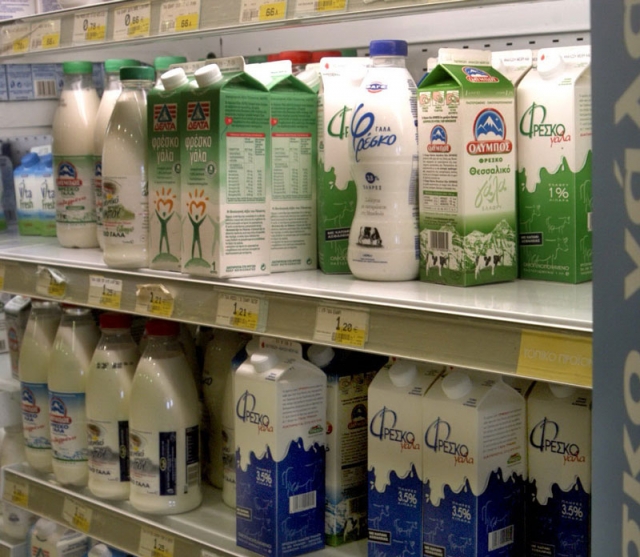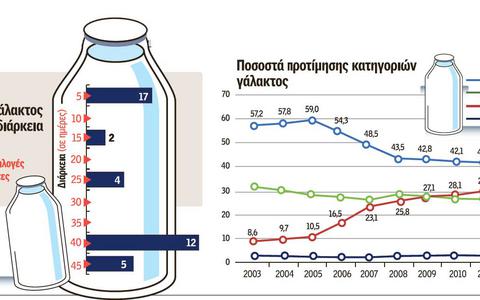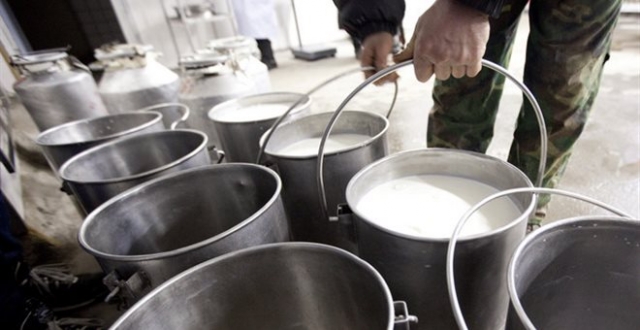Picture: www.iefimerida.gr
A legislative change affecting milk may lead to more choices for consumers with products which have not been sold on the Greek market so far.
According to research by the Development Ministry, milk with a shelf-life of between 6 and 15 days may start to be produced.
According to Imerisia newspaper, Greeks buy milk with a shelf-life of either 5 days, or more than 40 days. Intermediate products are few. Today, there is no product on the market with a shelf-life of between 6 and 15 days, and only 6 products have a shelf-life of 15-40 days. However, there are 17 products in the category of up to 5 days and 17 with a shelf-life of more than 40 days.

www.paraskhnio.gr
This distortion is caused by the division between pasteurized milk and milk with "high" pasteurization and durability, which is applied only in Greece. The result is an artificial market polarization. Since production moves only between these two extremes, there are no intermediate choices. Therefore, if there are more options, competition increases and prices fall. This distortion is caused by the fact that Greece is the only country in the EU, which, despite the provisions of the Community and those applied in other countries producing dairy products, has a law determining that milk with low pasteurization has a shelf-life of five days. No other country-member of the EU has legislation determining the shelf-life of milk or any other products of animal origin. Even in Greece, the company is responsible for the date of expiry of meat, fish or yogurt, and not the state.

ysterografa.gr
Under the new regime, each company producing dairy products will determine the shelf-life according to the technology used. The definition of "milk of the day" is also suggested, which will apply to products which can remain in the store for two days. This will support small local companies and farmers. The cancellation of the "five days" shelf-life will support small companies again which will have a greater opportunity to reach other parts of Greece.
Deputy Development Minister Thanassis Skordas stressed that the changes will increase competition, create thousands of jobs and liberate milk prices to the benefit of consumers.

www.imerisia.gr
Today Greeks buy more expensive pasteurized milk than other Europeans. Thus, despite the economic crisis, the average price of milk has increased in recent years with a higher rate than other food products. From 2009 to now, milk prices have increased by 8.5 %, while food prices, by 4.9%. In 2013, milk prices continued rising (3.5%), at a time when food prices fell by 0.6%. Even milk price per litre rose from 1.12 euro in 2009 to 1.27 euro in 2012 (a 13.4% increase). Today's regime in the sector will burden the whole cycle of production, distribution, retail and consumption of milk with 25%.
This is so because milk needs to be distributed daily to very small parts of the country in short terms. This is coupled with the cost of return and the lack of alternative distribution channels.

www.skai.gr
The price of milk is high for farmers. Despite security arrangements, local production of cow's milk has declined in the last five years, and the national quota has increased: from about 700,000 tonnes of production at a quota of 837,000 tonnes 5 years ago, this year, there are about 600,000 tonnes of production at a quota of 871,000. Upon examination of whether prices of high-temperature pasteurized milk are higher than prices of other types of milk, it can be seen that there are cheaper and more expensive versions of milk with high pasteurization compared to the other milk, and there are companies which offer both types at the same prices.
But since 50% of low pasteurization milk is sold at small points of sale (mini markets, kiosks, grocery stores, bakeries, etc.), and a large percentage of high pasteurization milk is sold in large supermarkets, the cost of distribution of low pasteurization milk is significantly higher than the other categories, mainly because of the daily supplies to a large network.
Reasons for high prices
- Production is fragmented. There are many small units, and the average livestock unit has a huge number of cows in the larger countries of the EU.
- In Greece, barn farming is preferred, where animals are fed with expensive forages (in accordance with Community legislation, forages have strict standards regarding their ingredients in order to protect public health, but also to ensure the full food coverage of animals), unlike most foreign countries, where animals are bred mainly in open grasslands at a low price.
- The majority of livestock units (95%) employ between 1 and 4 people (85% - 1 - 2 people), mainly self-employed, so the cost of production is not affected by the reduction of wages.
- Because of the morphology of the territory, the collection of milk is expensive. It is produced mainly in northern Greece, far from Athens and the islands, and this increases transport costs.
1. The retail price of a product is determined by the pricing policy of the company, on the basis of demand, competitive conditions and price.
2. Milk with high pasteurization has a higher cost of treatment, but milk with low pasteurization has a much higher transport cost and price return.